All English posts
The European Union and Russia are not only neighbours but also strategic partners. At the upcoming 27th summit, in Nizhny Novgorod, the EU will be represented by Herman Van Rompuy, President of the European Council and by José Manuel Barroso, President of the European Commission. Catherine Ashton, High Representative of the Union for Foreign Affairs and Security Policy, and Karel De Gucht, Commissioner for Trade, will also take part. Russia will be represented by Dmitry Medvedev, President of Russia. Foreign Minister Sergey Lavrov and Minister of Economic Development Nabiullina will also participate. The summit will take place over two days, beginning with an informal dinner on 9 June and continuing with a plenary session on the morning of 10 June, followed by a working lunch and a press conference. 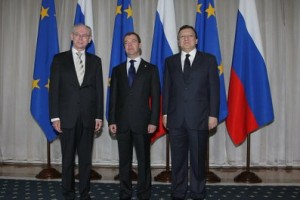
The parties are expected to discuss the following issues:
the global economy and global governance issues;
EU-Russia relations, in particular the EU-Russia Partnership for Modernisation;
international issues, including the developments in North Africa and the Middle East.
The Summit will on build on the good results achieved at last year’s EU Russia Summits, held in Rostov and Brussels.
The EU and Russia will take note of the good progress made in the implementation of the EURussia Partnership for Modernisation, which is a key initiative providing additional momentum to ongoing work in the Dialogues under our Common Spaces. The EU and Russia will discuss the state of play in the negotiations on Russia’s accession to the WTO, which are now at multilateral level. The new EU-Russia Agreement, which is currently being negotiated, should provide a solid basis for deepened bilateral relations in the 21st century covering all areas of EU-Russia relations.
A growing economic relationship
Economic ties between Russia and the EU have grown substantially over the last years. Russia remains the EU’s third most important trading partner in goods (after the US and China), with 87 billion EUR in exports to Russia (6.4% of all EU exports, 4th place after US, China, Switzerland) and 155 billion EUR in imports in 2010 (10.4 % of all EU imports, 3rd place after China and US, mostly natural resources). The EU is thus by far the largest market for Russian goods.
In 2010, both imports and exports rose by approximately 32 % compared to 2009, after having been hit by the global economic crisis. Russia enjoyed a trade surplus of 68 billion EUR with the EU. Russia’s total account surplus rose by 47% compared to 2009 and reached $ 79 billion in 2010. More specifically, Russia is the EU’s most important single supplier of energy products, accounting for over 25% of the EU consumption of oil and gas. In turn, Russia’s economy remains highly dependent on the export of energy raw materials, with the EU as its most 2 important destination. In 2010 63% of Russia’s exports consisted of crude oil, oil products and natural gas. The EU accounts for 88% of Russia’s total oil exports, 70% of its gas exports and 50% of its coal exports.
Financial cooperation
Financial cooperation with Russia began in the early 1990s, under the TACIS program, which has in the meantime been replaced by the European Neighbourhood and Partnership Instrument. To help smooth Russia’s transition, a whole range of sectors were supported. Since 1991, a total of around €2.8 billion of assistance was provided through the European Commission. A number of TACIS projects are still being implemented until 2013. Given the significant recent improvements in the Russian Federation’s fiscal position, the need for large volumes of financial assistance has declined. In fact, Russia herself has become a donor. Financial cooperation is now specifically targeted to meet the objectives defined in the road-maps to the EU-Russia Common Spaces. Cooperation is now carried out on the principle of co-financing by the EU and Russia. Most notably, Russia is co-financing Cross Border Cooperation programmes. Emphasis is on higher education cooperation, with Erasmus Mundus and Tempus supporting mobility of students and teaching staff.
Furthermore, funding for Russia also came from the Nuclear Safety Instrument (€500 million since 1991) and a number of other thematic programs. The European Democracy and Human Rights Instrument (EIDHR) financed 14 human rights projects in Russia in 2010 for nearly € 2 million, and the Institution Building Partnership Programme supported 16 projects with NGOs for a total of € 5 million.
EU-Russia relations – background
The legal basis for EU relations with Russia is the Partnership and Cooperation Agreement (PCA) which came into force on 1 December 1997 for an initial duration of 10 years, and which has been automatically extended beyond 2007 on an annual basis. It sets the principal common objectives, establishes the institutional framework for bilateral contacts, and calls for activities and dialogue in a number of areas. The EU is currently working with Russia on a new agreement to replace the PCA. Both the EU and Russia have experienced many political, economic and social changes since the entry into force of the PCA in 1997. The new agreement must reflect these changes as well as the new challenges linked to the globalised world in which we are living. At the St. Petersburg Summit in May 2003, the EU and Russia agreed to reinforce their cooperation by creating four “common spaces”:
the Common Economic Space aiming to make the EU and Russia’s economies more compatible to help boost investment and trade;
the Common Space on Freedom, Security and Justice covering the area also known as Justice and Home Affairs;
the Common Space on External Security aiming to enhance cooperation on foreign policy and security issues; and
the Common Space on Research, Education and Culture aiming to promote scientific, educational and cultural cooperation.
Materials from the site of the European Delegation to Russia.
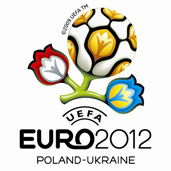 “Around two out of three Poles think preparations for the Euro 2012 football championships are not going well and three out of four are pessimistic about the national team’s chances at the finals, finds a new poll.
“Around two out of three Poles think preparations for the Euro 2012 football championships are not going well and three out of four are pessimistic about the national team’s chances at the finals, finds a new poll.
The survey by Homo Homini, commissioned by Polish Radio found that 60 percent of respondents think that construction work in Warsaw, Gdansk and other cities hosting the event are proceeding poorly, with 22 percent thinking preparations are going well, while 18 percent have no opinion on the issue.
As regards preparations by the national team, led by coach Franciszek Smuda, 75 percent of Poles are not expecting success at the finals.
The poll was taken, however, before Poland’s 2-1 win over Argentina in Warsaw on Sunday, with goals from Adrian Mierzejewski and Pawel Brozek for the home side and Marco Ruben for the visitors.
Though a good result for Poland, Argentina put out a second-string 11 without stars such as Lionel Messi, Javier Mascherano, Javier Pastore, Carlos Tevez and Gonzalo Higuain.
Poland’s final game of the season comes against France on Thursday, which was meant to take place at the PGE Gdansk stadium in the north – but due to incomplete preparations it has had to be moved to Legia Warszawa’s venue in the capital.
Government optimistic
Sports Minister Adam Giersz, however, has said he is confident that everything will be ready for the finals next summer.
“The venues will be up and running well ahead of the first whistle,” he told Polish Radio. “Construction should be ready a year before the event although there may be slight delays with the National Stadium in Warsaw and maybe with the one in Wroclaw [western Poland],” the sports minister added. He argued that many previous host countries reported delays in their preparations and yet the tournaments took place as scheduled.“The construction of the stadium in South Africa was completed only a month before the [2010] World Cup,” said Giersz.
Marcin Herra, head of PL2012, the company supervising the preparation process, says that 70 of the construction work is being carried out according to the schedule. The remaining 30 percent has caused some delays to road and railway construction, including the renovation of the central train stations in Warsaw and Poznan”.
Source – Polskie Radio.
Serbia, Mladic in exchange for EU membership?
26 May 2011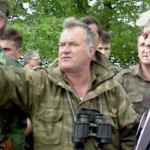
From EuroNews
The arrest of Ratko Mladic is certainly a major step towards a faster integration of Serbia within the EU. His detention has also closed a bloody chapter in the former Yugoslav history, bringing the region closer to reconciliation.
The full co-operation with the International Criminal Tribunal for the former Yugoslavia (ICTY) is the main pre-condition for the negotiations with Brussels. The EU signed a so-called Stabilisation and Association Agreement (SAA) – including an interim deal aiming to facilitate economic and trade relations – with Serbia in April 2008, but then decided to freeze it under Dutch pressure. Only in December 2009 the Netherlands put aside objections related to Belgrade’s performance on war crimes probes.
General Mladic led the militia of the breakaway Republica Srbska, which sought to impose a Serbian identity on the multi-ethnic state of Bosnia; he was the architect of ethnic-cleansing schemes that included the Siege of Sarajevo and the 1995 Srebrenica Massacre in which about 8,000 Bosnian Muslim men were systematically executed. He was indicted by the UN war crimes tribunal in The Hague in 1995 for genocide and other crimes.
The hunt for Mladic started already at the end of 1995. Many observers in Serbia and in the EU suspect that the general has been protected for years by Serbian security forces loyal to President Slobodan Milosevic, who was ousted from power in October 2000. Mladic’s former political master Radovan Karadzic was arrested in 2008 and is still in The Hague.
By the end of the year, after so long negotiations, Serbia will have the chance of formally becoming an EU membership candidate and getting a starting date for accession talks. Serbian President Tadic rejected criticism that Belgrade had only taken action following international pressure and had not calculated when to arrest Mladic, who is considered a hero by local nationalists. But there are still too many unanswered questions.
The European integration of Serbia, Bosnia, and Kosovo is the promise in exchange for concessions to old enemies and the achievement of a complete stable peace in the region. The problem is, however, to understand whether the 27 are ready to accept new members, who have such big open questions in their recent history.
Giuseppe D’Amato
The Polish Constitution of May 3, 1791, was the first Fundamental Law adopted in Europe and the second world’s Constitution after that of the United States in 1787. The document was a secret project and its final version was drafted among others by the politician and thinker Hugo Kołłątaj.
The Sejm session which led to the adoption of the Constitution was held in an atmosphere of a coup d’état. Many deputies came to the Royal Castle in Warsaw, where the session was taking place, in secrecy and the castle was guarded by numerous troops. After a heated, but short debate, the Fundamental Law was adopted with a majority of votes.
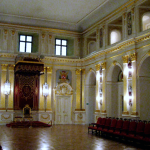
- Chamber of Senate at the Royal Castle in Warsaw – wikipedia.org
The Constitution of 1791 comprised 11 articles. It introduced the principle of independence for the nobility and townspeople and the separation of powers between the Legislature (a bicameral Sejm), the Executive and the Judiciary branches.
Peasants came under the protection of the law and government. This was the first step toward the ending of serfdom. The Constitution provided for “ordinary” meetings of the Sejm once in two years and special sessions when required by national emergency. The Lower Chamber, called the Chamber of Deputies, was made up of 204 deputies and plenipotentiaries of 24 royal cities. The Upper Chamber of Senators comprised 132 senators, including province governors, castellans, government ministers and bishops. The Constitution abolished the liberum veto.
The Executive power was in the hands of a royal Council, known as the Guardians of the Laws. This Council was presided over by the King and included five ministers appointed by him: the minister of police, the minister of the seal (internal affairs), the minister of the seal of foreign affairs, the minister of war, and the minister of the Treasury. The decrees issued by the King required countersignature by a minister.
To enhance the unity and security of the Commonwealth, the Fundamental Law abolished the Union of Poland and Lithuania in favour of a unitary State. This decision was the end of the Union of the Crown of Poland and the Grand Duchy of Lithuania, which had been established in 1569. The Constitution changed the free royal election system to a dynastic elected monarchy, which was meant to reduce the influence of foreign powers in royal elections.
The Constitution acknowledged the Roman Catholic faith as the dominant religion, but at the same time it guaranteed freedom to all religions.
The Constitution of May 3rd remained an unfinished work. It was in effect for only one year before Poland lost its independency. The last attempt at preserving the its legacy was the insurrection led by Tadeusz Kościuszko. In 1794, in Cracow, he issued the unprecedented “Proclamation of Połaniec,” granting freedom and ownership of land to peasants who fought in the insurrection. The insurgents had some initial victories, but then the armies of Russia, Austria and Prussia launched a military crackdown. The defeat of Kościuszko’s forces led in 1795 to the third and final partition of Poland.
May 3rd was restored as an official Polish holiday in April 1990, after the fall of communism. In 2007, May 3rd was in addition declared a Lithuanian national holiday. The first joint celebration by the Polish Sejm and the Lithuanian Seimas took place on May 3rd, 2007
Poland-Libya. Tusk criticizes Europe for its “hypocrisy” and low protection of civilians.
12 Apr 2011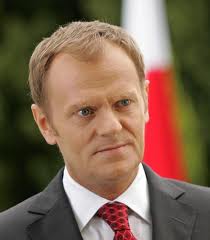 Poland highlights the European “hypocrisy” in Northern Africa. This is one of the main reasons behind Warsaw’s decision not to participate in NATO’s military operations in Libya, Polish Prime Minister Donald Tusk told Gazeta Wyborcza. According to him, Europe risks creating the impression it only intervene when oil supplies are at stake.
Poland highlights the European “hypocrisy” in Northern Africa. This is one of the main reasons behind Warsaw’s decision not to participate in NATO’s military operations in Libya, Polish Prime Minister Donald Tusk told Gazeta Wyborcza. According to him, Europe risks creating the impression it only intervene when oil supplies are at stake.
“Although there exists a need to defend civilians from a regime’s brutality, isn’t the Libyan case yet another example of European hypocrisy in view of the way Europe has behaved towards Gaddafi in recent years or even months?” said Mr. Tusk. He also added: “If we want to defend people against dictators and repression, torture or imprisonment, then this rule must be universal.”
In future Poland, a usually staunch NATO ally that sent soldiers to Iraq and still has 2,600 troops in Afghanistan, “will take decisions on military involvement elsewhere only when” there’s “a 100 percent conviction that it is absolutely necessary,” explained Mr. Tusk.
Warsaw that assumes the European Union’s rotating six-month presidency in July is also a close ally to the United States. President Obama decided to withdraw its military after the first days of the intervention. Poland has no national interests in Libya and faces parliamentary elections in autumn. The current war has shown that the EU does not have a common foreign policy that it is still in the hands of the states. French president Sarkozy and British Prime minister Cameron’s initiative in Africa has provoked divisions in the 27-nation bloc.
Poland is the biggest beneficiary of the regional EU aids. Talks on the EU’s next multi-year budget are set to begin later this year under the Polish presidency. At that time it would be important not to forget other types of “hypocrisy”.
The tandem, following Alexander II’s path.
6 Mar 2011In his speech to commemorate the 150th anniversary of the abolition of serfdom, President Dmitry Medvedev drew parallels between Tsar Alexander II’s reforms and the modernisation drive his currently engaged in. “In essence we are continuing a political course that was set 150 years ago.”
Medvedev told an audience in St. Petersburg’s Mariinsky Palace. “Freedom cannot be put off another day.” “After 150 years, the feeling of serfdom remains in much of our consciousness. Even when we discuss questions important for society we get scared of taking decisions because this feeling of serfdom sits deep inside us,” said the deputy head of the ruling council of United Russia, Yury Shuvalov, to the Interfax news agency.
Alexander II`s March 3, 1861 decree to end centuries of feudal ownership of peasants by landlords was accompanied by other major reforms like the creation of elected local councils and improvements in the legal system. “This was not the Soviet experiment but a project of normal, humane development, initiated by Alexander II,” Medvedev said. “From the historic point of view, it was he who was proved right. Not Nicholas I, not Stalin,” Medvedev added.
The “liberal” reform of Alexander II’s early years in power was followed by nearly half a century of reaction, as his two imperial successors failed to develop the country economically or socially beyond the level of a backward country. Many historians also believe creation of an urban working class from the emancipation and loosening of political controls by Alexander was a direct cause of the Russian Revolution that ended imperial rule.
Article – Reuters
“Russia has revealed details of its ambitious plan to upgrade its army over the next ten years, planning to spend US$ 650 billion.
First and foremost, Russian defense will focus on the development of strategic nuclear weapons, construction of over 100 military vessels for Russian Navy, including construction of four originally French-made Mistral-class amphibious assault ships, and the introduction into the Air Force of over 1,000 helicopters and 600 military planes, including fifth generation PAK-FA fighter.
Most of the military hardware will be equipped with next-generation weaponry.
For the first time ever, Russia is planning to buy military equipment from NATO-member countries – two Mistral helicopter carriers will be bought in France (with two more licensed to be built in Russia), as well as samples of armored vehicles from Italy and elements of personal combat systems also from France.
Moscow’s plans to modernize Russian strategic nuclear forces do not contravene the newly-signed New START nuclear arms reduction treaty with the US, which aims at the reduction of up to a third of the strategic nuclear weapons in both Russia and the US”.
Russia Today – February 25th, 2011.
If the renewal is a success, it will leave Russia less reliant on the nuclear arsenal it inherited from the USSR. “Russia needs a professional non-commissioned officer corps to train specialists who can really put these arms to effective use,” Pavel Felgenhauer, an independent military analyst, told AP. “This spending necessitates a whole new kind of military.”
On the same topic:
Article 1. Associated Press —-Article 2. Ria Novosti July 2010.
SIPRI, Top 100 arms-producing companies – 2009.
21 Feb 2011 For the first time, the turnover of arms manufacturing companies in 2009 exceeded $ 400 billion, an increase of 8% over 2008 and 59% compared to 2002. The figures are contained in the annual report of SIPRI, the Peace Research Institute in Stockholm.
The U.S. holds 61% of turnover, with 8 companies in the top ten. Among the most important companies Lockheed, Boeing and British Bae Systems. The Italian Finmeccanica is eighth in this special standing with 13 billion dollars and 3.3% of the market share.
“This is the 8th year in which Russian companies have been covered by the SIPRI Top 100. There may be other Russian companies that should be in the list but for which insufficient data is available. Figures for Russian companies are from the Centre for Analysis of Strategies and Technologies (CAST), Moscow.
This is the first year in which United Aircraft Corporation (UAC) and United Engine Corporation (UEC)—the two new main Russian state-owned conglomerates—reported parent company figures and subsidiary figures. In previous years, these figures were reported separately for each subsidiary or not reported at all. This year figures for Irkut, MiG and Sukhoi are reported as subsidiaries of UAC. UEC also reported overall arms sales figures. Although reported as a parent company here, Vertolety Rossii is a subsidiary of OPK Oboronprom.”
For more detail on Russian arms-producing industry consolidation, see Jackson, S., ‘Arms production’ SIPRI Yearbook 2010; and Perlo-Freeman, S. et al., ‘The SIPRI Top 100 arms-producing companies, 2007’, SIPRI Yearbook 2009, pp. 286–87.
Report – SIPRI – Stockholm –
Gorbachev, the Kremlin and Russia.
21 Feb 2011 Former Soviet leader Mikhail Gorbachev urged Russia to adopt a new approach to terrorism – and for the Middle East to embrace democracy. He also criticized Prime Minister Vladimir Putin and President Dmitry Medvedev for saying they will decide between them who should run for president in the March 2012 presidential vote.
“Most likely he (Putin) will not run for the presidency. Two terms is enough – well, he has had his two terms. What will they do in the future? Maybe he and (President) Medvedev will swap places again,” said former Soviet leader who is 80 next month.
He called for an investigation into statement by an assistant to the judge who convicted oil tycoon Mikhail Khodorkovsky who said the judge did not write the verdict and read it against his will in the Moscow courtroom. The main pro-Kremlin United Russia party is a “bad copy” of the Communist Party of the Soviet Union.
SKYNEWS – February 21st, 2011.
The Khan’s Palace of the Bakhchisaray Historical and Cultural Reserve could become the first Crimean site of cultural heritage to be included on the UNESCO World Heritage List, the main information policy department of the Crimean Council of Ministers has reported, referring to the director general of the Bakhchisaray Historical and Cultural Reserve, Yevhen Petrov.
The procedure foresees the carrying out of preliminary restoration work. The inclusion of the Khan’s Palace on the list would mean it might be able to receive financial support from the UNESCO Fund. “By Sept. 1, 2011 a dossier, which will include the plan of management of the territories and facilities of the reserve, and reports on the monitoring of the facilities of the Khan’s Palace, is to be submitted to UNESCO,” Yevhen Petrov said.
Source: Interfax-Ukraine
Welcome
We are a group of long experienced European journalists and intellectuals interested in international politics and culture. We would like to exchange our opinion on new Europe and Russia.
Categories
- Breaking News (11)
- CIS (129)
- Climate (2)
- Energy&Economy (115)
- EU Eastern Dimension (85)
- Euro 2012 – Sochi 2014 – World Cup 2018, Sport (43)
- Euro-Integration (135)
- History Culture (198)
- International Policy (261)
- Military (74)
- Interviews (18)
- Italy – Italia – Suisse (47)
- Odd Enough (10)
- Poland and Baltic States (126)
- Religion (31)
- Russia (421)
- Survey (4)
- Turning points (4)
- Ukraine (176)
- Российские страницы (113)
Archives
- November 2020
- October 2020
- September 2020
- August 2020
- July 2020
- May 2020
- April 2020
- March 2020
- January 2020
- December 2019
- November 2019
- October 2019
- September 2019
- August 2019
- July 2019
- June 2019
- May 2019
- April 2019
- March 2019
- February 2019
- December 2018
- November 2018
- October 2018
- September 2018
- August 2018
- July 2018
- June 2018
- May 2018
- April 2018
- March 2018
- February 2018
- January 2018
- December 2017
- November 2017
- October 2017
- September 2017
- August 2017
- July 2017
- May 2017
- March 2017
- January 2017
- December 2016
- November 2016
- October 2016
- September 2016
- July 2016
- June 2016
- May 2016
- April 2016
- February 2016
- January 2016
- November 2015
- October 2015
- September 2015
- June 2015
- April 2015
- March 2015
- February 2015
- January 2015
- December 2014
- November 2014
- October 2014
- September 2014
- August 2014
- July 2014
- June 2014
- May 2014
- April 2014
- March 2014
- February 2014
- January 2014
- December 2013
- November 2013
- October 2013
- September 2013
- August 2013
- July 2013
- June 2013
- May 2013
- April 2013
- March 2013
- February 2013
- January 2013
- December 2012
- November 2012
- October 2012
- September 2012
- August 2012
- July 2012
- June 2012
- May 2012
- April 2012
- March 2012
- February 2012
- January 2012
- December 2011
- November 2011
- October 2011
- September 2011
- August 2011
- July 2011
- June 2011
- May 2011
- April 2011
- March 2011
- February 2011
- January 2011
- December 2010
- November 2010
- October 2010
- September 2010
- August 2010
- July 2010
- June 2010
- May 2010
- April 2010
- March 2010
- February 2010
- January 2010
- December 2009
- November 2009
- October 2009
- September 2009
- August 2009
Our books




